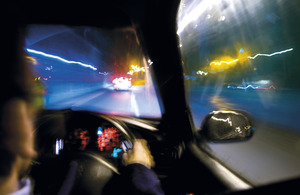Drink driving rules tightened to improve road safety
Road Safety Minister Stephen Hammond announces drink driving rules are tightened to improve road safety.

Drink driving image
The most dangerous drink drivers will now have to pass a medical before they are allowed back on the roads under a change in the law announced today (2 May 2013) by Road Safety Minister Stephen Hammond.
The changes, which come into force from 1 June 2013, mean that high risk offenders will need to pass a medical confirming they are no longer alcohol dependent at the end of their disqualification and before they start driving.
Currently, all high risk offenders must pass a medical examination before they can be issued with a driving licence following their disqualification. However, drivers can start driving as soon as they have applied for their driving licence. Evidence suggests that some high risk offenders delay their medical in order to continue driving. The changes will prevent high risk offenders from driving until they have passed their medical examination and been granted a licence.
The changes also mean that drink drivers who refuse to give permission for a blood sample to be analysed will now be high risk offenders. This means that they will only get their licence back following disqualification if they pass the required medical.
Road Safety Minister, Stephen Hammond said:
Drink drivers are a menace and it is right that we do everything we can to keep the most high risk offenders off the road.
These changes will tighten up the law on drink driving and will mean that the most dangerous offenders will have to prove they are no longer dependent on alcohol before they are allowed to get back behind the wheel.
The new measures will also see those drink drivers who obstruct the police by refusing to allow their blood samples to be analysed treated the same as other high risk offenders.
Notes to editors:
The changes will come into force from 1 June 2013.
High risk offenders are drivers who are:
- convicted of 2 drink driving offences within 10 years
- convicted of driving when they were at 2.5 times or more above the legal alcohol limit
- convicted for refusing to give the police a sample of breath, blood or urine to test for alcohol
Last year, DVLA were notified by the courts of just over 50,000 drink drive convictions. Nearly 22,000 of those were classed as high risk offenders.
Press office
DVLA Press Office
Longview Road
Morriston
Swansea
SA6 7JL
Email press.office@dvla.gov.uk
Only for use by journalists and the media: 0300 123 2407